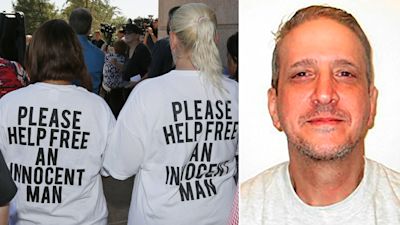Death row inmate Richard Glossip who was minutes from execution could be freed

A man who came within minutes of being executed for a murder carried out by someone else is likely to have his conviction overturned - eight years later.
Richard Glossip survived numerous execution dates and is still alive today, but only because of a blunder by prison officials.
Now the Oklahoma attorney general had decided the murder conviction is unsafe and has asked an appeal court to overturn it.
Attorney General Gentner Drummond said: “The State has reached the difficult conclusion that justice requires setting aside Glossip’s conviction and remanding the case to the district court.
“After thorough and serious deliberation, I have concluded that I cannot stand behind the murder conviction and death sentence of Richard Glossip.
“This is not to say I believe he is innocent. However, it is critical that Oklahomans have absolute faith that the death penalty is administered fairly and with certainty.
"Considering everything I know about this case, I do not believe that justice is served by executing a man based on the testimony of a compromised witness."
Glossip was convicted of the 1997 murder of Barry Van Treese, a businessman who was found beaten to death in the motel he owned, and where Glossip was the manager.
The killing was carried out by the motel's 19 year old handyman Justin Sneed - but in a plea deal, he agreed to blame Glossip for hiring him to carry out the crime.
In return, he escaped a death sentence and was given life imprisonment.
Glossip has spent 25 years on death row, protesting his innocence and pointing out he had no prior criminal record.
Today's announcement that he could finally be exonerated is an extraordinary turn of events.
In 2015, Glossip was served his “final meal” three times as he came within hours of execution.
On the first two occasions, legal appeals earned him a temporary reprieve.
But on the third attempt, all appeals were rejected, and officials inside the Oklahoma State Penitentiary were preparing to put him to death.
The prisoner, who was kept in a cell next to the death chamber, was waiting in his boxer shorts, with a blanket to keep him warm.
At the appointed time of 3pm, other prisoners began to bang on their doors - a traditional farewell when one of their number is being executed.
I was inside the prison too. Glossip had asked me to be one of his chosen witnesses because I’d written about his case and concluded he was a victim of a miscarriage of justice.
With me was Sister Helen Prejean, his spiritual advisor and the author of “Dead Man Walking”. An hour after the scheduled execution, we were told it had been called off, but were not told why.
When we emerged from the prison we learned that the execution was stopped because prison officials had been given the wrong drug to kill him.
The three drug cocktail which forms the lethal injection should have included potassium chloride.
Instead, the pharmacist had sent potassium acetate.
State officials pondered continuing with the execution anyway, but after some debate, the then Governor Mary Fallin took the advice of her Attorney General, and announced a postponement.
In the weeks and months that followed, several prison officials lost their jobs, and a scathing report revealed that another death row prisoner had been executed with the wrong drug months earlier.
All executions in Oklahoma were halted for seven years - giving Glossip's attorney Don Knight more time to dig deeper into the conviction.
In the past year independent lawyers raised serious questions about the case, and even Republican politicians who supported the death penalty said they feared an innocent man was going to be executed.
Glossip’s attorney Don Knight praised the attorney general’s decision.
“The Independent Counsel’s report reached the same conclusion that the Reed Smith independent investigation for Oklahoma legislators did - that a cumulation of serious errors occurred that likely changed the outcome of his 2004 trial," he said.
"It is now clear that it would be unconscionable for the State to move forward with Mr Glossip’s execution when there is so much doubt surrounding his conviction.
"We thank General Drummond for his courageous decision to take a deeper look at this difficult case and urge the Court of Criminal Appeals to quickly grant the Attorney General’s request and remand Mr Glossip’s case to the trial court for further proceedings.”
The court must now decide whether to agree with the application for the conviction to be vacated, and local prosecutors must decide whether to bring a new murder charge, a lesser charge, or no charge.
Want a quick and expert briefing on the biggest news stories? Listen to our latest podcasts to find out What You Need To Know.